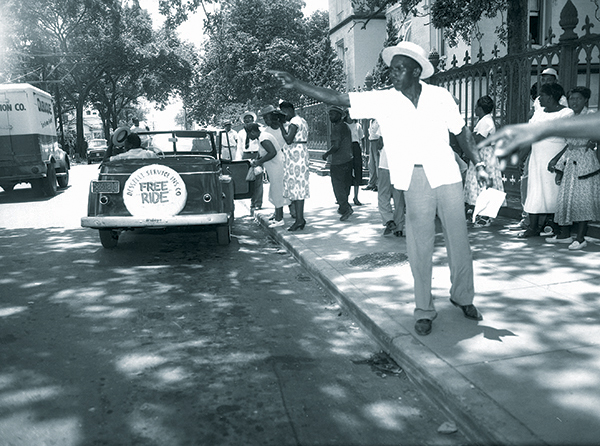African-Americans faced discrimination at work and in schools. They faced further unfair treatment on the segregated bus system which compelled them to take the backseat as well as give up seats for a white male or female who joined the bus later.
In defiance of such prejudice, African-Americans in 1953 organized the first large-scale boycott of a southern city’s segregated bus system in Baton Rouge.
The eight-day long protest of the segregated seating system on city buses triggered when the leader of the boycott, Rev. T. J. Jemison, struck a deal with the city’s leadership after five days without gaining substantial improvements for black riders.
The boycott made national headlines and inspired civil rights leaders across the South. Two and a half years later, Rev. Martin Luther King Jr. consulted Jemison about tactics used in Baton Rouge, which he deployed during The Montgomery bus boycott which ultimately defeated segregation and exposed the injustices of Jim Crow laws.
What then inspired the bus boycott in Baton Rouge?
Baton Rouge had a significant black population. The black community had a particular grievance against the municipal bus service. In 1950, the financially stressed city bus company won an exclusive contract to transport black and white residents from their neighborhoods to jobs and businesses.
To the chagrin of the Black folks, the transport line lobbied the city council to revoke the licenses of nearly 40 competing African American-owned bus services but what broke the camel’s back was when the council approved a fare increase from 10 to 15 cents for the still-struggling bus company in three years.
As at the time of the boycott, one-third of African American residents of Baton were unemployed. Those with jobs earned low wages as domestic workers or unskilled laborers. Life was thus tough but Baton Rouge’s unique attributes gave it the will to rebel.
Just north of the city was Southern University, a nexus for African American political organization, legal education, and economic development. Adjacent to the university campus, the sizable black middle-class community of Scotlandville was made up of educated professionals.
Then there was the young Jemison, hired in 1949 as pastor of Mt. Zion First Baptist Church, the largest black church in Louisiana. His father was president of the National Baptist Convention, the nation’s largest and most prestigious African American organization, with more than six million members.
By mid-February 1953, the same day the bus company had asked the city council for a fare increase, Jemison made a bold and unusual appearance before the all-white council. He appealed for the right of black passengers, who paid the same fare as whites, to sit down when seats were available.
One month later, with the bus company’s support, the city council unanimously approved Ordinance 222, which changed the segregated seating policy to a model already in place in some southern cities. Riders would fill the bus on a “first come, first served” basis, blacks from the back and whites from the front. Again buses with empty white sections would not have to pass up paying black riders.
Bus drivers immediately received a directive about the new policy, but Ordinance 222 was not enforced for three months. The drivers refused to comply.
When Martha White, a 23-year-old housekeeper, tired from a day’s work took a seat behind a driver, adding that she will stand when a white boarded, the driver ordered her out but another African-American lady also sat in solidarity. He then threatened to have the women arrested and summoned police.
H. D. Cauthen, the bus company manager, upon asking the driver to obey the city council’s ordinance, without success fired him but bus drivers’ union responded with a walkout.
After four days of striking, union leaders turned to State Attorney General Fred Leblanc, who overturned the ordinance, ruling that it violated Louisiana’s segregation laws. The June 18 decision that ended the drivers’ strike galvanized the African American community.
At a packed meeting called that night, participants vowed to stay out all night, knocking on doors and informing community members to stay off the buses the next day.
When day broke, African-Americans ignored the buses when they approached. Blacks who also owned automobiles picked up anyone needing a ride and take them where they needed to go.

Within four days, the bus company manager was quoted in the press as saying the boycott was hundred percent effective. “A continuation of this loss,” he said, “will ultimately mean we will have to cease operations.”
With the Baton Rouge Bus Company facing financial collapse (more than 80 percent of its riders were African American); events took a dangerously serious turn. African American leaders and city council members were receiving death threats.
“On June 23 Jemison announced he had reached an agreement with the city council, and the boycott was over. On June 24 the city council passed Ordinance 251 stipulating that the bus company would reduce the number of reserved “white” seats, but in exchange, the “first-come, first served” practice was ended, and black riders would have to remain standing even if seats in the whites-only area were available. Jemison’s acceptance of the compromise came as a complete surprise, even to UDL board members. Many in the black community felt betrayed by the deal.”
Short-lived as it was, the Baton Rouge civil rights action nevertheless made national headlines. Widely circulated African American newspapers like the Chicago Defender and the Pittsburgh Courier spread the news that 20,000 black riders had boldly challenged segregation practices on Louisiana buses.
The Baton Rouge boycott showed that direct, peaceful protest could be effective if it was well organized and the cause appealed universally to the black community.










